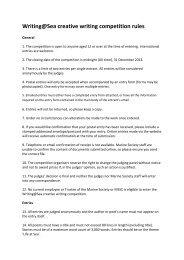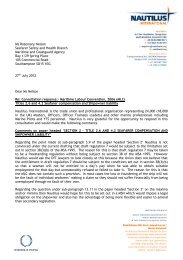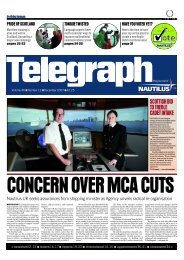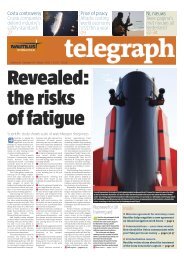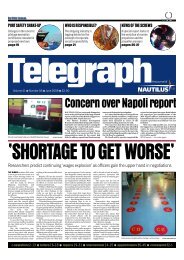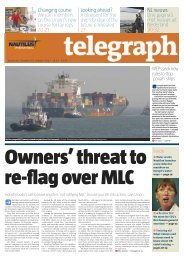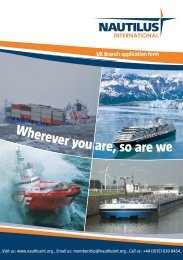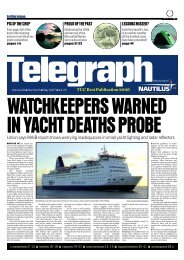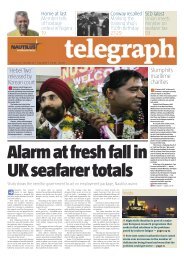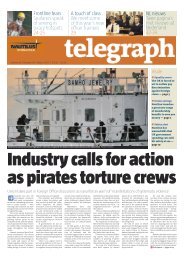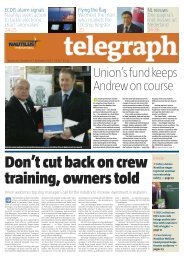Create successful ePaper yourself
Turn your PDF publications into a flip-book with our unique Google optimized e-Paper software.
PLAN<br />
July 2010 | nautilusint.org | telegraph | 29<br />
MARITIME HERITAGE<br />
A new life<br />
for Africa’s<br />
oldest ship<br />
An appeal has been launched to convert a vessel<br />
built in 1898 into a floating clinic for Lake Malawi...<br />
b<br />
The London-based maritime insurance<br />
specialist Thomas Miller is making a major<br />
contribution to an ambitious project to<br />
give new life to what is believed to be the oldest ship<br />
still afloat in Africa, the Glasgow-built Chauncy<br />
Maples.<br />
To mark its 125th anniversary, Thomas Miller has<br />
launched a fund-raising appeal to help with the restoration<br />
of the 112-year-old ship and to convert it to a<br />
floating clinic that will provide medical care in one of<br />
the world’s poorest countries.<br />
The Chauncy Maples Malawi Trust needs to<br />
raise up to £2m to enable the planned refit to be<br />
completed within a 12 month timeframe. Thomas<br />
Miller is contributing £250,000 and had already<br />
raised a similar amount from its friends, employees<br />
and business associates even before the official<br />
launch of its appeal last month.<br />
Chauncy Maples was built in Glasgow in 1898 for<br />
British missionaries working in central Africa, and<br />
was shipped to Mozambique in 3,481 small parts.<br />
Together with an 11-ton boiler mounted on<br />
wheels, the vessel components were moved by river<br />
and then overland, with local tribesmen carrying<br />
and dragging them the final 100 miles to Lake<br />
Malawi for the two-year assembly work.<br />
Since then, Chauncy Maples has had a chequered<br />
career with service as a gunboat, a trawler and even<br />
a refuge from Arab slave traders. Until recently, the<br />
vessel was used as a bar.<br />
The restoration project aims to use qualified local<br />
marine engineers and apprentices to ensure the<br />
floating clinic is fully operational in one year.<br />
The initiative is badly needed: Malawi is the<br />
world’s fifth poorest nation and half a million people<br />
living along the 560km coastline of the lake have<br />
The Chauncy Maples was shipped out from Glasgow in more than 3,480 small parts and went on to serve in such<br />
varied roles as a missionary ship, a gunboat, a trawler and ‒ most recently ‒ a bar<br />
neither access to health care nor medical protection<br />
from conditions such as cholera, malaria, tuberculosis,<br />
dysentery and HIV-Aids. Many of those seeking<br />
medical attention currently paddle dug-out canoes<br />
up to 80km to reach medical aid, risking fatal attacks<br />
by hippos and crocodiles.<br />
Thomas Miller chairman Hugo Wynn-Williams<br />
said the company had decided to support the project<br />
because it would make a huge difference to the local<br />
community and reflect the firm’s global reach and<br />
maritime heritage.<br />
Director Mark Holford said several potential<br />
donors had already come forward to offer more<br />
practical support, such as equipment or services.<br />
Chauncy Maples is presently fitted with a Crossley<br />
diesel engine that replaced the former steam plant in<br />
1967, and Thomas Miller has had talks with ‘a major<br />
manufacturer of diesel engines who we hope will<br />
offer us a new main engine on favourable terms’.<br />
Trust director Janie Hampton added: ‘Sailing<br />
between the small village communities scattered<br />
around the lake, Chauncy Maples will bring free<br />
treatment for common diseases, dentistry, maternity<br />
care, immunisation for babies, family planning<br />
and information on safe sex.<br />
‘Presently, Malawi citizens have a life expectancy<br />
of just 36 years; with only one doctor for every<br />
52,000 people, the infant death rate is 111 per 1,000<br />
births — 20 times worse than Europe. We are certain<br />
that the team of nurses that will be living and working<br />
aboard Chauncy Maples will reduce mortality<br />
rates of both adults and children.’<br />
LEGAL<br />
How the SS Robin will look in its new role as a maritime museum and learning centre Picture: Ruben Beltran<br />
Robin rises again<br />
An important milestone was<br />
reached last month in the<br />
preservation of the 1890-built<br />
historic ship SS Robin, with the<br />
delivery of a purpose-built pontoon<br />
to support the vessel and provide<br />
the base of a new museum.<br />
The world’s only remaining<br />
steam coaster will now be housed<br />
in a structure which is ‘part ship,<br />
part floating dock’ — to be used as<br />
a maritime museum and learning<br />
centre for young people.<br />
The new SS Robin museum<br />
should be ready to open to the<br />
public in 2012.<br />
Things were not looking so<br />
good for the Robin two years ago.<br />
She had been used as a floating<br />
museum and arts centre for many<br />
years in London’s West India<br />
Dock, but by 2008 her hull had<br />
deteriorated to such an extent that<br />
she was in danger of sinking and<br />
had to be closed to the public.<br />
A fundraising effort was<br />
underway to pay for the necessary<br />
repairs, but the project was given<br />
additional urgency because a new<br />
railway station was about to be<br />
constructed across the exit to the<br />
dock, cutting off the vessel’s route<br />
to dry dock.<br />
Fortunately, a £1.9m loan from<br />
the Crossrail company enabled<br />
the Robin’s trustees to take her<br />
to a repair yard in Lowestoft and<br />
to commission the 50m x 15m<br />
pontoon from the Finomar shipyard<br />
in Szczecin, Poland.<br />
‘It was only when we got to the<br />
dry dock stage that we were able<br />
make a full assessment of the ship’s<br />
condition,’ says project director<br />
David Kampfner. ‘That’s when<br />
we realised we had two options:<br />
the restoration route, where we<br />
made the vessel seaworthy but<br />
essentially had to give her a 21st<br />
century hull; or the conservation<br />
route, where we kept the old hull<br />
but had to accept that she would be<br />
out of the water permanently.’<br />
The conservation option was<br />
chosen, partly because this would<br />
allow the Robin’s interior to be<br />
seen in something like its original<br />
condition. ‘You can’t really see the<br />
cargo hold properly if you need<br />
to put in a bar, or classrooms,’<br />
explains Mr Kampfner. ‘Sometimes<br />
children would even come away<br />
from their visit [to West India Dock]<br />
thinking that old ships had full 01<br />
modern staircases because of the<br />
additions that were there. Now<br />
we’ve been able to strip away some<br />
nasty 1970s plywood and reveal<br />
some wonderful seams of rivets.’<br />
Classrooms, exhibitions and<br />
a café will now be located inside<br />
the new pontoon, which will be<br />
large enough to walk around inside<br />
— giving the museum as a whole<br />
10 times as much space as it had in<br />
its previous incarnation.<br />
With the conservation project<br />
progressing well, the next step<br />
is to find a new mooring for the<br />
museum. Initial negotiations have<br />
focussed on the south bank of the<br />
Thames in central London, but<br />
David Kampfner says that other<br />
offers would be considered: ‘We<br />
would be happy to go to any city<br />
that would appreciate having a<br />
museum about seafarers and the<br />
Merchant Navy. In fact, if Telegraph<br />
readers have any suggestions<br />
for the new mooring, please get<br />
in touch with us via our websites<br />
www.ssrobin.org and www.<br />
kampfner.com.’<br />
www.nautiluslegal.org<br />
Legal Helpline<br />
0800 9 87 88 88<br />
(Monday to Friday 9am - 5pm)<br />
For out of hours and emergency shipping enquiries please continue to call your present contact<br />
Your <strong>Nautilus</strong> <strong>International</strong> membership entitles you and your immediate family<br />
to a full range of legal services provided by specialist lawyers.<br />
z<br />
z<br />
z<br />
z<br />
z<br />
z<br />
Accident Claims<br />
Clinical (Medical) Negligence<br />
Family Law<br />
Housing Advice<br />
Personal Insolvency<br />
Discounted Residential<br />
Conveyancing<br />
Members Email: member@nautiluslegal.org<br />
z<br />
z<br />
z<br />
z<br />
z<br />
z<br />
Home Information Packs<br />
Standard Single Will<br />
Standard Mirror Will<br />
Lasting Power of Attorney<br />
Disease Claims<br />
Employment Law Claims<br />
Family Email: family@nautiluslegal.org



